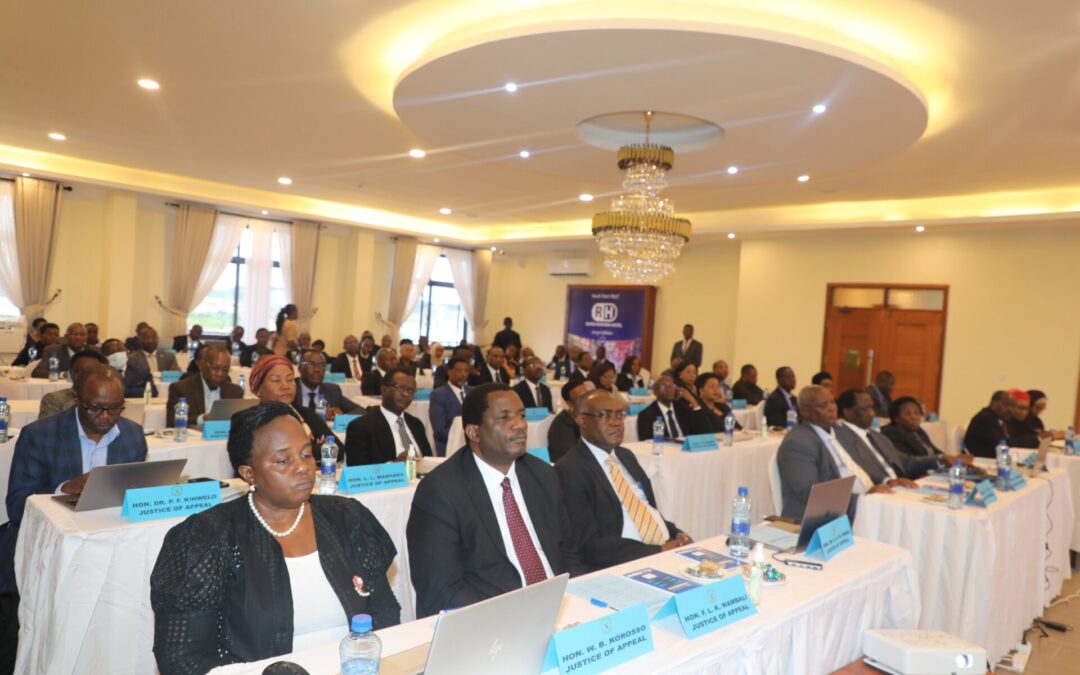Training of Appellate Judges on the use of the new Electronic Case Management System (e-CMS) begins in Dodoma, Tanzania
The judiciary in Dodoma, Tanzania is about to undergo a major transformation with the introduction of the new Electronic Case Management System (e-CMS). To ensure a seamless transition and effective use of this innovative system, an intensive training programme has been organised for appellate judges. The launch of this training marks a pivotal moment in the modernisation of the judicial process in Dodoma.
The e-CMS is designed to streamline and digitise the case management process, offering a wide range of features that will enhance efficiency, transparency and accessibility within the judiciary. With the implementation of this system, judges will have access to a centralised platform for filing, tracking and managing cases, thereby reducing reliance on traditional paper-based processes.
The training programme aims to equip appellate judges with the necessary skills and knowledge to realise the full potential of the e-CMS. Through a series of workshops, seminars and practical sessions, judges will be guided through the various functionalities of the system, including case registration, document management, scheduling and reporting.
The training will also focus on familiarising judges with the security protocols and data protection measures built into the e-CMS to ensure the confidentiality and integrity of case-related information. This is critical to maintaining the trust and credibility of the Dodoma judiciary.
The opening ceremony of the training programme was attended by distinguished dignitaries, including senior members of the judiciary, government officials and representatives from the technology and legal sectors. The presence of such influential figures underscores the importance of this initiative and highlights the collective commitment to modernising Dodoma’s judicial infrastructure.
In his opening remarks, the Chief Justice highlighted the transformative impact of the e-CMS and its potential to revolutionise the way cases are managed and adjudicated. He stressed the importance of embracing technological advances to improve the delivery of justice and uphold the rule of law.
The training programme is structured to include both theoretical and practical aspects, ensuring that judges not only understand the theoretical framework of the e-CMS, but also gain hands-on experience in navigating the system and performing essential tasks. This holistic approach is designed to promote a comprehensive understanding and ability to use the e-CMS in real-life scenarios.
As part of the training curriculum, specialised sessions will be conducted to address the specific needs and challenges faced by Appellate Judges in handling complex and high value cases. The e-CMS offers tailor-made features to facilitate the management of appeal proceedings, including case review, decision drafting and collaboration between panel members.
The training programme also includes interactive discussions and knowledge-sharing sessions, allowing judges to share insights, best practices and potential strategies for optimising the use of the e-CMS. This collaborative environment fosters a sense of community and collective learning, empowering judges to take full advantage of the system’s capabilities.
In addition to technical skills, the training programme places a strong emphasis on the ethical and professional responsibilities associated with the use of the e-CMS. Judges are guided on how to maintain impartiality, uphold judicial ethics and ensure fair and equitable access to justice through the digital platform.
The successful implementation and adoption of the e-CMS depends not only on technological competence, but also on the willingness of the judiciary to embrace a culture of innovation and adaptability. The training programme aims to instil a mindset of continuous learning and improvement, encouraging judges to proactively explore the potential of the e-CMS to enhance their judicial functions.
The training programme is a collaborative effort, bringing together expertise from the judiciary, technology providers, legal practitioners and other relevant stakeholders. This multi-faceted approach ensures that the training is comprehensive, addresses the diverse needs and perspectives of appellate judges, and is aligned with the broader objectives of judicial modernisation in Dodoma.
The launch of training for appellate judges on the use of the new e-CMS in Dodoma, Tanzania, marks a significant step towards a more efficient, transparent and accessible justice system. The collective commitment to embracing technological advances and enhancing the capacity of the judiciary reflects a forward-looking approach to delivering justice and upholding the rule of law in Dodoma.
The training programme promises to equip appellate judges with the necessary skills, knowledge and mindset to harness the transformative potential of the e-CMS, paving the way for a modernised and progressive judiciary in Dodoma, Tanzania.
Tanzania Media
- Kanyala Ferry Launch: TEMESA’s New Service for 15,000 Sengerema Residents (Mwanza) - 18 August 2025
- Russia-Tanzania Naval Cooperation: How the Smolny Training Ship Boosts Dar es Salaam’s Maritime Security - 18 August 2025
- Tanzania’s ICGLR Commitment: Stabilising the DRC & Great Lakes Region - 18 August 2025




